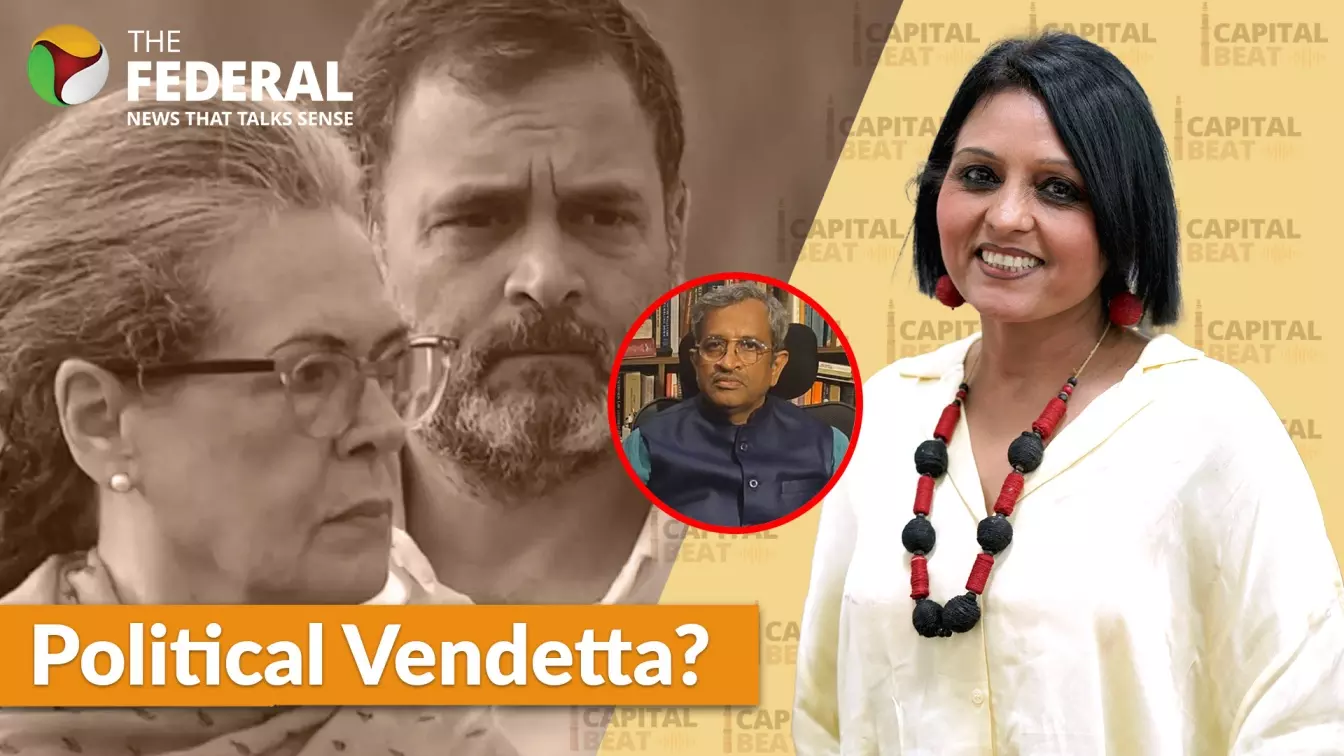
Sanjay Hegde on National Herald Case
Capital Beat: Could Sonia, Rahul face arrest in ED's National Herald case?
ED files chargesheet against Sonia and Rahul Gandhi in National Herald case. Will the allegations stand legal scrutiny?

In this episode of Capital Beat, senior advocate Sanjay Hegde joins The Federal’s Neelu Vyas to decode the Enforcement Directorate’s (ED) chargesheet in the National Herald case. The document names senior Congress leaders Sonia Gandhi and Rahul Gandhi as primary accused in a money laundering case filed under various sections of the Prevention of Money Laundering Act (PMLA).
The chargesheet was submitted before the Rouse Avenue Court in Delhi and invokes Sections 44, 45, and 70 of the PMLA. In addition to Sonia Gandhi and Rahul Gandhi, it names Congress associates Suman Dubey and Sam Pitroda, along with companies Young Indian and Dotex Merchandise Pvt Ltd, and Sunil Bhandari, a representative of Dotex.
Also read: National Herald case: ED should be disbanded, says Akhilesh
Key allegations and figures
The ED alleges that Congress leaders and associates conspired to gain control of Associated Journals Ltd (AJL) — the publisher of National Herald — by transferring its shares to Young Indian for a nominal Rs 50 lakh. Sonia and Rahul each reportedly hold 38 per cent stake in Young Indian.
Also read: National Herald case living example of Congress's corruption: BJP on ED charge sheet
According to the ED, a Rs 90.21 crore loan given by the Congress party to AJL was converted to equity, effectively giving Young Indian ownership of real estate assets worth Rs 2,000 crore. The agency also claims that Young Indian was registered as a not-for-profit under Section 25 of the Companies Act but engaged in no charitable activities.
Money laundering and corporate structure
Hegde explained that such corporate restructuring is common in the business world. “These things often happen at the instance of tax planners,” he said. He questioned whether this transaction qualifies as money laundering under Indian law.
Tracing the origins of the term “money laundering”, Hegde said it emerged during the 1920s prohibition era in the US and was initially associated with illegal arms and drug trade. In India, the PMLA covers a wider range of offenses.
“The PMLA in India created a schedule which encompassed almost everything,” Hegde explained, implying that its broad scope enables selective enforcement.
Question of conspiracy
Neelu asked whether the charges look like a case of criminal conspiracy. Hegde responded: “Almost everything can occasionally be termed a criminal conspiracy.” He noted that this phraseology is being applied broadly in the current matter.
He added that the ED’s complaint is contingent on the original complaint, filed by Subramanian Swamy, reaching a final judgment. “If the predicate offence goes, then the money laundering complaint also goes,” he explained.
Timing and optics of the chargesheet
The ED filed the chargesheet on the last permissible day, raising questions about intent. Hegde said, “ED officers also know that those whom they prosecute today, they may not be able to prosecute tomorrow.”
He added that many Congress leaders, including Sonia and Rahul, had not received a copy of the chargesheet despite media outlets reporting extensively on its contents. “These are selective leaks,” he said, suggesting the ED uses media to influence public perception.
Role of media and public trial
Neelu raised concerns about the media conducting a “public trial” before legal proceedings. Hegde noted that Supreme Court has condemned such leaks but expects no introspection from media houses. “Media today exists for nightly debates and TRPs,” he said.
Hegde also questioned the ED’s reference to a 2017 Income Tax assessment order that claims Young Indian evaded Rs 414 crore in taxes. “They are using the persuasive value of that order,” he said, adding that it is still under appeal.
Possibility of arrest and political implications
Could Rahul or Sonia Gandhi be arrested? “Yes, as undertrials,” Hegde confirmed, pointing out that ED has the power to arrest and deny bail. “That is itself a huge Damocles sword,” he said.
He emphasised that the case would only hold if the original complaint is proven. “If the original case doesn’t stand, then this falls automatically,” he said.
On whether this is a case of political vendetta, Hegde remarked: “The real intention is to wave the sword and show the sword. It is not only with regard to this family but a message to others as well.”
The path ahead
The next hearing is scheduled for April 25, when the court may take cognisance of the chargesheet. Hegde believes any arrest decision would require political clearance. “They may expect that courts will take their own time about deciding,” he said.
As Congress workers continue to protest and the Opposition unites in dissent, the National Herald case returns to the spotlight, raising fresh questions about law, politics, and power in India.
(The content above has been generated using a fine-tuned AI model. To ensure accuracy, quality, and editorial integrity, we employ a Human-In-The-Loop (HITL) process. While AI assists in creating the initial draft, our experienced editorial team carefully reviews, edits, and refines the content before publication. At The Federal, we combine the efficiency of AI with the expertise of human editors to deliver reliable and insightful journalism.)

